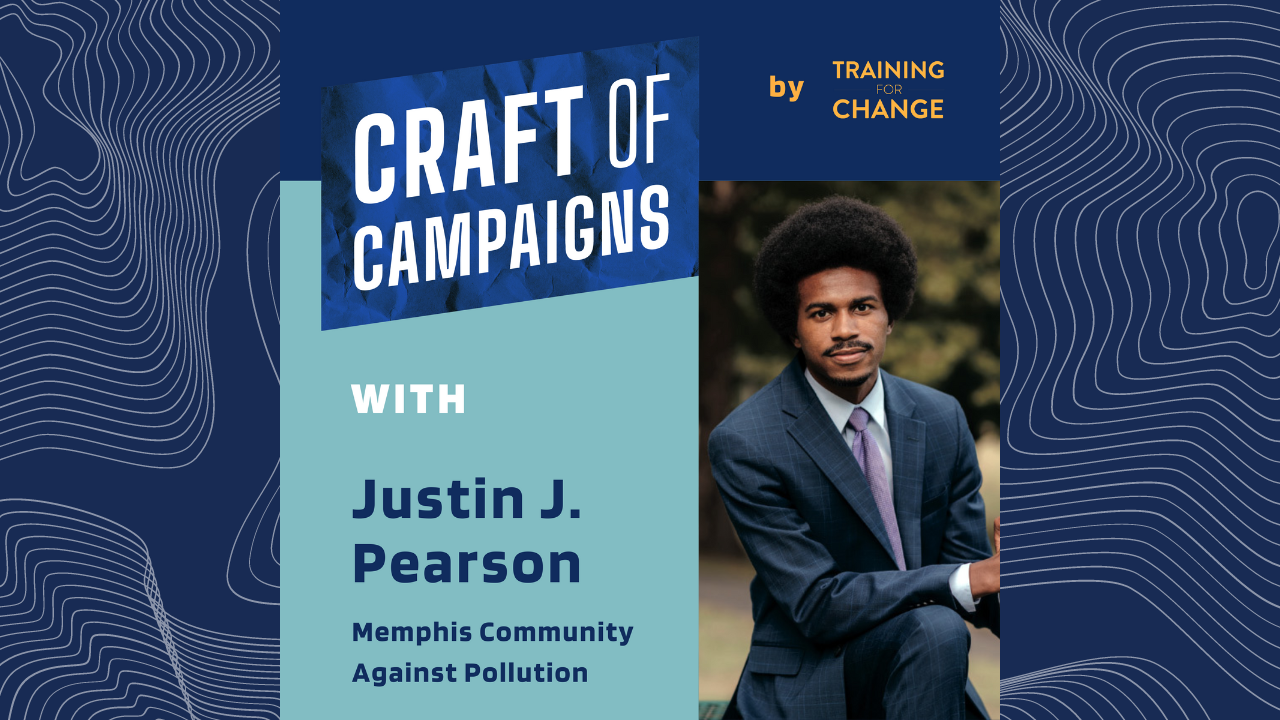The Craft of Campaigns podcast highlights stories and lessons from issue-based action campaigns beyond one-off mobilizations and single election cycles. Campaigns channel grassroots energy to win concrete victories, build winning coalitions, and topple pillars of power standing in the way of justice. In each episode, we interview organizers about how a campaign unfolded, the strategy decisions they made, and the lessons we can draw for our current moment.
For this Craft of Campaigns podcast, I talked with Justin J. Pearson of Memphis Community Against Pollution, who last week won a special election to fill Tennessee State Senator Barbara Cooper’s seat, and will become one of the state’s youngest elected officials. You can read the writeup below or check out the full episode here or at Apple Podcasts, Spotify or wherever you get your podcasts.
At first, it looked like the pipeline would be built without a fight.
Oil companies Plains All American and Valero Energy announced in December 2019 that they planned to build a 45-mile pipeline through a Black neighborhood in Southwest Memphis to bring crude from Oklahoma oil fields to Valero’s local refinery. Rather than take a direct route across Memphis’s wealthier white neighborhoods further north, the pipeline would be diverted twenty miles to the south.
It seemed like a done deal. The companies were almost guaranteed to get the permits they needed from the Army Corps of Engineers. No comprehensive environmental impact review was required. The City of Memphis did not, to anyone’s knowledge, have regulatory authority. And the companies had the right to seize the property of any landowners who would not grant them an easement by eminent domain. They had already started taking private land in a neighboring county across the river in Arkansas. Memphis was next.
Three months after the pipeline had been announced, few local politicians were aware of it. As Memphis Community Against the Pipeline organizer Justin J. Pearson recalled later, “I emailed a few councilmembers in the fall, nearly a year after it was announced, and one wrote back, ‘Wait, they’re going to build a pipeline?’” But then a company representative accidentally admitted to environmental racism. At a community forum organized by the Boxtown Neighborhood Association in February 2020, a supervising land agent for Plains All-American told the crowd that the company had taken the path of least resistance in plotting the pipeline through a predominantly Black neighborhood. Neighborhood activists used the statement to galvanize anger as they raised the alarm about the pipeline.
An ad hoc resistance effort began as a slow burn, as questions about the companies’ lack of transparency and potential risks to the local aquifer bubbled up in neighborhood meetings and Facebook groups over the summer of 2020. Rather than respond directly, Plains All-American tried to neutralize this quiet, mostly-online opposition with donations to nine local nonprofits, like the Memphis NAACP. The company even hired the group’s past president as its local spokesperson.
In 2020, five people with roots in Southwest Memphis formed Memphis Community Against the Pipeline (MCAP) to change the public narrative that nothing could be done to stop the pipeline and to rally elected officials to the cause.
MCAP got off to a fast start. By the time of the group’s first public action, a rally in a public park two months later, organizers had convinced several state representatives and a local environmental group, Protect Our Aquifer, to come out in opposition to the pipeline. At the same time, the Southern Environmental Law Center offered to work with MCAP on a legal strategy to challenge both the Army Corps of Engineers’s approval of a key federal permit and the oil companies’ seizure of land by eminent domain.
MCAP canvassed Boxtown to find out which residents had been approached by the company to sign an easement. They discovered that many residents who had signed the company’s legal documents didn’t understand them and were opposed to the pipeline. They also found a few who had refused to sign and were facing potential suit under eminent domain.
In early 2021, the company did in fact file suit against two elderly landowners, Scottie Fitzgerald and Clyde Robinson, after they refused easement offers of $3,000 and $8,000, respectively, to grant the company permanent access to a combined .36 acres of land. MCAP made sure both residents connected with as many reporters and politicians as possible. The press extensively covered their stories, shifting the tone at City Council and County Commission meetings. Instead of lamenting that “there’s not much we can do,” some local elected officials began saying, “There’s got to be something we can do.”
MCAP’s canvassing and phone-banking forced local elected Democrats to take a side: the pipeline company or Black homeowners. The campaign also got a lift from Al Gore and the Rev. William J. Barber III, who headlined local rallies that winter. Celebrities like Mark Ruffalo and Danny Glover also tweeted out their opposition.
Plains continued to try to weaken community opposition, giving out over $1 million to 26 local nonprofits by February. But MCAP’s grassroots organizing started to move local elected officials off the fence and into taking a stand for the first time. When the Army Corps granted the pipeline a key permit, the area’s congressman, Rep. Steve Cohen, asked the Biden Administration to revoke it. The City Council and Shelby County Commission also introduced nonbinding resolutions condemning the pipeline and asking the company to reroute it. By March, commissioners voted to refuse to sell the companies a key parcel of county-owned land.
The legal strategy also continued to move forward. Plains sued ten landowners for their refusal to sign easements, and, in a victory for organizers, the judge granted MCAP the right to join them as co-plaintiffs. Because the court hearings were virtual, the judge also allowed anyone logging on to Zoom to state who they were at the beginning of the hearing. Dozens of local MCAP supporters chimed in to stand with the landowners. The following month, the Southern Environmental Law Center filed a complaint with the EPA alleging that Tennessee’s state environmental regulatory agency had violated Title VI of the Civil Rights Act of 1964 by issuing a permit to a pipeline that would disproportionately harm Black people. The SELC also filed a lawsuit on behalf of MCAP challenging the ability of a private company to use eminent domain to seize land for an oil pipeline. If successful, the lawsuit could put any future pipeline in the state in jeopardy.
MCAP didn’t want to put all its hope in the court system, so organizers kept meeting with county officials, searching for other points of leverage. In April, a county commissioner made an offhand suggestion to one of the organizers: “What if we banned pipelines from being built within 1,000 feet of a home, business or school?” MCAP consulted their attorneys, who couldn’t find a reason it wouldn’t work. So they asked allies on the council and board of commissioners to start working on legislative proposals.
Still, MCAP organizers weren’t sure if any strategy would generate enough leverage to stop the pipeline or convince the companies to withdraw; having researched other pipeline fights, they were prepared for a years-long battle. But in July, days before the council and commission were scheduled to vote on the 1,500 foot buffer ordinance, Justin received a call from Councilmember Jeff Warren, a campaign ally. “And he says, ‘The pipeline has been canceled.’ And the level of exuberation and gladness and joy and yelling… it was just, disbelief, like, ‘Wow, we did this thing.'”
Plains All American announced it was canceling the pipeline the Friday before the Fourth of July in 2021, apparently hoping the decision wouldn’t receive much press coverage. The company claimed the decision was due to lower oil demand during the pandemic. But Plains’s other public statements indicate otherwise. “They immediately said, ‘We’re canceling this project, but we don’t want any laws passed,'” recalled Justin. “We said, ‘Well, if you’re done with us, why does it matter what we’re doing locally?’ And so that was a shot across the bow for us to say, like, look, we really need to keep pressing and keep forcing this issue.” MCAP successfully pushed the county and city to pass new restrictions on future pipelines in the months that followed. And MCAP has since used the momentum generated by the pipeline to take on a new fight against a plan that could result in power company coal ash being stored in the city, in the process renaming themselves Memphis Community Against Pollution. The group also defeated an attempt by the State Legislature the following year to limit the city’s ability to regulate pipelines.
The campaign against the pipeline only took off after MCAP convinced a few homeowners in the pipeline’s path to be the face of the opposition. Until then, local elected officials could simply say, “There’s nothing we can do.” Once officials had to tell those homeowners they wouldn’t do anything, both local governing bodies began passing symbolic resolutions. Eventually, they “discovered” their own ability to use zoning rules to keep potential pipelines away from the city’s residential neighborhoods. MCAP’s willingness to go door to door and build strong relationships with the people on the frontlines – combined with the group’s ability to broadcast stories and work the insider channels of local Democratic Party politics – paid off in political willpower.
You can hear more about the campaign in my conversation with Justin on the Craft of Campaigns podcast.

